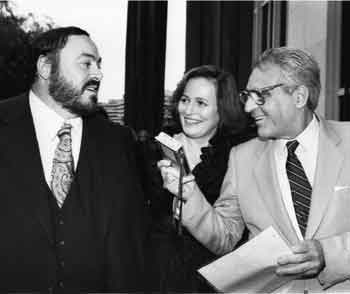|
SEPTEMBER 2007 - In early September, Italy and the world lost one of the greatest operatic singers of all time, and a “titan of pop culture,” as the New York Times referred to Luciano Pavarotti, who died of pancreatic cancer at his home in Modena, Italy.
Pavarotti was born in 1935 in a family of modest means in the outskirts of Modena, a town noted for its love of opera. His father was a baker and amateur opera singer; his mother worked in a cigar factory. Luciano grew up listening to his father’s recordings of Beniamino Gigli and Enrico Caruso, am ong others. After teaching elementary school for a few years, Pavarotti began to study voice. ong others. After teaching elementary school for a few years, Pavarotti began to study voice.
He made his opera debut in Reggio Emilia in 1961, when he performed in the role of Rodolfo in La Boheme. His first performance in the United States came four years later in Miami, where he sang in Donizetti’s Lucia di Lammermoor. That same year Pavarotti had his La Scala debut performing with Mirella Freni in Franco Zeffirelli’s production of La Boheme. A 1969 performance of I Lombardi opposite Renata Scotto was recorded on a private label and widely distributed.
In 1972, Pavarotti took the New York Metropolitan Opera by storm in a production of La fille du regiment, when he achieved a record 17 curtain calls for hitting nine high Cs in the opera’s signature aria. Following that performance he began to make frequent television appearances, starting with his role as Rodolfo (La Boheme) in the first Live From The Met telecast in March 1977. The telecast attracted the largest audience ever for a televised opera, an event that led to a cover story in Time magazine.
But what made Pavarotti a household name around the globe was his rendition of Giacomo Puccini’s aria “Nessun Dorma.” The piece was chosen by BBC TV as its theme music for coverage of the 1990 FIFA World Cup in Italy. This was followed by a wildly successful “Three Tenors” concert held on the eve of the World Cup finals at Caracalla with Placido Domingo and Jose Carrera.
Pavarotti had his critics, who claimed that he lacked acting talent, was unreliable, had difficulty learning roles and reading music, and, that in later years, his voice lost the distinctive timbre and eloquence of his early years. But in the end, it is perhaps his spectacular success at bringing opera to the masses that will be remembered most.
Less well-known is Pavarotti’s involvement in humanitarian work, such as hosting annual charity concerts and joining singers from all parts of the music industry to raise money for United Nations causes. His contributions toward the reconstruction of Bosnia, benefit concerts for victims of earthquakes in Armenia, work with Diana, Princess of Wales to eliminate land mines, earned him the title of United Nations Messenger of Peace. In 2001, Pavaroti received the Nansen Medal from the UN High Commission for Refugees for his efforts in raising money for refugees worldwide.
At his funeral in Modena, thousands paid tribute to Pavarotti. Friend and fellow tenor, Andrea Bocelli sang Mozart’s “Ave Verum Corpus.” The Prime Minister of Italy, Romano Prodi said in his remarks that Pavarotti “made music an instrument for life against war.” Pope Benedict XVI offered his condolences on the death of this “great artist who honored the divine gift of music through his extraordinary interpretative talent.”
As Pavarotti’s casket was carried out of the Modena cathedral, a recording of his trademark “Nessun Dorma” played over a loudspeaker. In the sky above, the Italian Air Force team soared above the church, painting the sky with the green, white, and red smoke in the colors of the Italian flag.
Pavarotti leaves behind his second wife, Nicoletta, and four daughters.•
(Reprinted from Voce Italiana September 2007)
|

![]()
 ong others. After teaching elementary school for a few years, Pavarotti began to study voice.
ong others. After teaching elementary school for a few years, Pavarotti began to study voice.